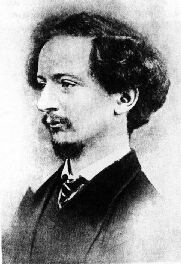 |
(Algernon Charles) Swinburne
(1837-1909 e.v.)
by T. Apiryon
Copyright © 1995 Ordo Templi Orientis. All rights reserved.
 |
English lyric poet and critic; Crowley's primary poetic influence. Viewed by many of his contemporary Victorians as blasphemous and depraved, Swinburne is now recognized as one of England's greatest poets and critics, and as one of the greatest parodists of all time. His intoxicating poetry, whether in English, French, Latin or Greek, is characterized by aggressive alliteration, driving anapaestic rhythms, and a defiance of restraint and convention. His main themes are liberty, the relationship between pleasure and pain, and the psychology of sexual passion. He was pagan in his sympathies and fervently anti-theistic: "Thou hast conquered, O pale Galilean, the world has grown grey from thy breath" (from "Hymn to Proserpine").
Swinburne was born into an aristocratic family. His father, being an officer in the British Navy, was frequently away from home, and his mother tended to be somewhat overprotective of her son. He seems to have had some sort of nervous disorder, possibly Tourette's syndrome, which led to fits of trembling and outbursts of uncontrolled speech. He suffered through the demeaning discipline of Eton prior to proceeding to Oxford, where he met Dante Gabriel Rosetti and the Pre-Raphaelite Brotherhood, and helped to form a club of political radicals and religious skeptics. He left Oxford before taking a degree, and moved to London where he was supported by his father in his literary pursuits. He was befriended by Sir Richard Burton and became, for a time, his protegé. Unfortunately, Burton innocently introduced him to brandy. He nearly died in 1879 from alcoholism. He was rescued by his friend Walter Theodore Watts, who took him in and encouraged him to devote himself to his true will as a poet, which he did; subsequently publishing 27 volumes, beginning with The Heptologia, and gradually attaining great esteem.
His major works include The Queen Mother and Rosamond (1860); Atalanta in Calydon (1865, an attempt to recreate, in English, the spirit and form of Greek Tragedy); Poems and Ballads (1866, vigorously attacked for its "immorality" and "feverish carnality"); Songs Before Sunrise (1871, dealing with political and religious liberty); Songs of Two Nations (1875); Erechthus (1876); Poems and Ballads, Second Series (1878); three plays about Mary Stuart: Chastelard (1865), Bothwell, a Tragedy (1874) and Mary Stuart, a Tragedy (1881); The Heptologia (1880); Tristram of Lyonesse (1882), A Century of Roundels (1883); Poems and Ballads, Third Series (1889); Astrophel (1894); A Tale of Balen (1896); A Channel Passage (1904); a novel, Love's Cross-Currents (1904, previously serialized as "A Year's Letters" in 1877); a fragment of a novel, Lesbia Brandon (posth. 1952); and many anonymous parodies, including a famous parody of his own poetic style, called "Nephelidia" (1880). He also wrote well-known critical studies of William Blake, Victor Hugo, Ben Johnson and William Shakespeare.
"Till the slow sea rise and the sheer cliff crumble,
Till terrace and meadow the deep gulfs drink,
Till the strength of the waves of the high tides humble
The fields that lessen, the rocks that shrink,
Here now in his triumph where all things falter,
Stretched out on the spoils that his own hand spread,
As a god self-slain on his own strange altar,
Death lies dead."
--from "A Forsaken Garden"
"His speech is a burning fire;
With his lips he travaileth;
In his heart is a blind desire,
In his eyes foreknowledge of death;
He weaves, and is clothed with derision;
Sows, and he shall not reap;
His life is a watch or a vision
Between a sleep and a sleep."
-- from "Atalanta in Calydon"
"Life is the lust of a lamp for the light
that is dark till the dawn of the day that we die."
-- from "Nephelidia"
References:
Binyon, Laurence (Ed.); Selected Poems by Swinburne, Humphry Milford, Oxford, London 1944
Cassidy, John A.; Algernon C. Swinburne, Twayne Publishers, Inc., NY 1964
Paglia, Camille; Sexual Personae, Vintage Books, Random House, NY 1991
Shafer, Robert; From Beowulf to Thomas Hardy, Doubleday, New York 1924
Thomas, Donald; Swinburne, the Poet in his World, Oxford Univ. Press, NY 1979
Also see this and this.
5/9/95
Originally published in
Red Flame No. 2 -- Mystery of Mystery: A Primer of Thelemic Ecclesiastical
Gnosticism
by Tau Apiryon and Helena; Berkeley, CA 1995 e.v.